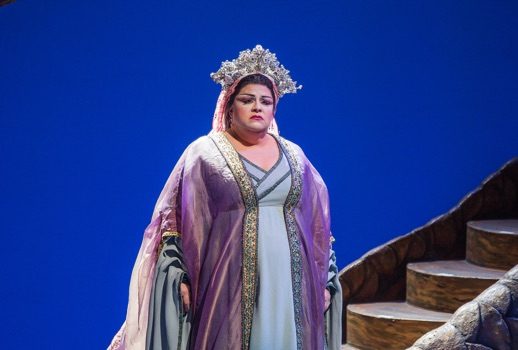

My last experience with this opera was in the massive, garish Zefferelli production at the Met, so, at first, I admired this production’s simplicity; later, I found it cramped and moody. Several elements, including a coiled dragon holding an opaque orb in its claw (where the ice princess symbolically resides) are quite effective. But the rest of the setting seemed generalized and stereotypical, and there simply wasn’t enough stage space for the massive chorus and crowd scenes.
There was much to enjoy about this Turandot—impressive orchestra and chorus work, fine conducting, mostly excellent singing—but I kept waiting for the evening to catch fire and the whole thing never lived up to its effective parts.
Stage director Rob Kearly does a fine job of bringing Act One’s huge crowd scenes together with effective movement patterns, but there’s not much he can do to enliven the Ping, Pang, Pong scene at the beginning of Act Two, as the princess’ advisors lament the state of things and long for their simpler lives of yore. I have many respected friends who love this scene, but this music leaves me cold except perhaps for their sentimental longing. I usually find (as I did here) that the audience just wants to get through it so we can meet Turandot at long last.
This Turandot was well worth the wait. In this brutally high and difficult role, Amber Wagner poured forth remarkably golden tone. “In questa reggia” was absolutely splendid, shaded and beautifully phrased, with all the requisite power this aria needs, and then some. Ms. Wagner exudes a bit too much warmth for this role, and does not have quite the haughty sense of the character, but she makes an unusually human Turandot. It’s a performance to admire for its sheer vocal magnificence.
Debuting tenor Stefano La Colla gave us a technically secure and generally well sung Calaf, though his performance is rather bland and wooden—mostly stand down center and let ‘er rip. His stock gestures during the riddle scene were risible. La Colla and Maestro Davis chose to use the standard concert ending for the famed aria “Nessun dorma,” which almost makes a flashing sign saying “Cue Ovation.” The aria was sung well if not brilliantly, and was greeted with a good if not huge ovation.
Suddenly, La Colla chose to break character, bow to the audience, and applaud the orchestra. It was an incredibly tacky moment, and I expect Andrew Davis will see to it that this doesn’t happen again. I mean, who does this guy think he is? Leontyne Price in her final Aida?
Maria Agresta floated gorgeous high notes and sung with creamy tone as the slave Liu, culminating in a genuinely touching death scene as she refuses to tell Calaf’s secret. Andrea Silvestrelli has completely lost the core of once-formidable bass, but here he compensates with a moving characterization as the pitiful Timur. Zachary Nelson, Rodell Rosen and Keith Jameson made small-voiced but important contributions as Ping, Pang, and Pong, as did Patrick Guetti as a fierce Mandarin.
Youthful Josh Lovell was completely miscast as the Emperor Altoum, making nothing of his observations about his daughter’s bloodthirsty behavior. It was a special treat to see Desiree Hassler, one of the strongest singing actresses of the Lyric Opera Chorus, given a nice cameo here as one of Turandot’s singing handmaidens.
As always, the Lyric Opera Chorus was superb, though in Act One the wall of sound that they produced veered into excess volume. Andrew Davis’ tempi seemed a bit slow, but he produced lovely orchestral textures and a fine sense of the percussion of the Far East.
I’m not sure the production succeeded in making believable the sudden transition of Turandot from cruel torturer to ardent lover, but what production ever does as Puccini laid down his pen and the Alfano ending begins. My takeaway from this evening is that I want to hear a lot more from Amber Wagner.
Photo: Andrew Cioffi

























Comments